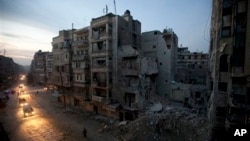A team of United Nations experts estimates that the 28-month civil war in Syria has already caused as much as $80 billion in damage to the nation’s economy.
The estimate assumes a quick end to the 28-month civil war, which is considered highly unlikely.
President Bashar al-Assad’s government estimates the damage to Syria’s public sector at about $15 billion, including damage to about 9,000 buildings. A week ago, Prime Minister Wael al-Haqi told the state-run Syrian Arab News Agency a week ago that the Syrian economy is “strong and balanced.”
But outside experts, including the authors of the U.N. study, paint a much grimmer picture.
The Syrian economy has shrunk by 35 percent and lost 40 percent of its gross domestic product, according to the study prepared for the U.N. Economic and Social Commission in Western Asia. It said foreign currency reserves had dropped from $17 billion to $4.5 billion and that unemployment had increased five-fold, from 500,000 to more than 2.5 million.
Syria’s currency, the pound, was trading at 47 pounds to the U.S. dollar before the civil war, but was trading at 200 pounds to the dollar last week.
Lead author of the U.N. study was Abdullah al-Dardari, President Assad’s deputy prime minister and minister of economics until a cabinet shift at the start of the revolution in March, 2010. He spoke about the U.N. assessment with the Associated Press in Amman last week.
A separate study by the Atlantic Council’s Rafik Hariri Center for the Middle East was even more dire in its conclusions, saying that the Syrian economy was in “total disarray.”
“Syria now has all the characteristics of a collapsed economy, with falling economic activity and trade, inflation that is likely to move into hyper-inflation, and the government finances its spending through printing money, and a currency that is depreciating at a breakneck pace,” wrote Atlantic Council fellows Mohain Khan and Faysal Itani.
One of Syria’s strongest supporters in the region, Iran, recently offered the Assad regime a credit line of $1 billion to shore up the Syrian pound. But Iran’s financial boost was only temporary, said the Atlantic Council report’s authors.
Syria’s bankers are finding it difficult to serve their customers, Middle East banking consultant Andrew Cunningham said over the weekend. He said the civil war is forcing many Syrians to resort to a cash economy and do business with street money exchangers instead of banks, which are under state control.
On March 5, Bank Bemo Saudi Fransi, the nation’s first privately-owned commercial bank in 40 years, lost 25 million Syria pounds when an armed gang attacked one of the bank’s convoys in Damascus.
Cunningham said the conflict has forced some banks to close their branch offices and many of their ATM machines.
The estimate assumes a quick end to the 28-month civil war, which is considered highly unlikely.
President Bashar al-Assad’s government estimates the damage to Syria’s public sector at about $15 billion, including damage to about 9,000 buildings. A week ago, Prime Minister Wael al-Haqi told the state-run Syrian Arab News Agency a week ago that the Syrian economy is “strong and balanced.”
But outside experts, including the authors of the U.N. study, paint a much grimmer picture.
The Syrian economy has shrunk by 35 percent and lost 40 percent of its gross domestic product, according to the study prepared for the U.N. Economic and Social Commission in Western Asia. It said foreign currency reserves had dropped from $17 billion to $4.5 billion and that unemployment had increased five-fold, from 500,000 to more than 2.5 million.
Syria’s currency, the pound, was trading at 47 pounds to the U.S. dollar before the civil war, but was trading at 200 pounds to the dollar last week.
Lead author of the U.N. study was Abdullah al-Dardari, President Assad’s deputy prime minister and minister of economics until a cabinet shift at the start of the revolution in March, 2010. He spoke about the U.N. assessment with the Associated Press in Amman last week.
A separate study by the Atlantic Council’s Rafik Hariri Center for the Middle East was even more dire in its conclusions, saying that the Syrian economy was in “total disarray.”
“Syria now has all the characteristics of a collapsed economy, with falling economic activity and trade, inflation that is likely to move into hyper-inflation, and the government finances its spending through printing money, and a currency that is depreciating at a breakneck pace,” wrote Atlantic Council fellows Mohain Khan and Faysal Itani.
One of Syria’s strongest supporters in the region, Iran, recently offered the Assad regime a credit line of $1 billion to shore up the Syrian pound. But Iran’s financial boost was only temporary, said the Atlantic Council report’s authors.
Syria’s bankers are finding it difficult to serve their customers, Middle East banking consultant Andrew Cunningham said over the weekend. He said the civil war is forcing many Syrians to resort to a cash economy and do business with street money exchangers instead of banks, which are under state control.
On March 5, Bank Bemo Saudi Fransi, the nation’s first privately-owned commercial bank in 40 years, lost 25 million Syria pounds when an armed gang attacked one of the bank’s convoys in Damascus.
Cunningham said the conflict has forced some banks to close their branch offices and many of their ATM machines.




